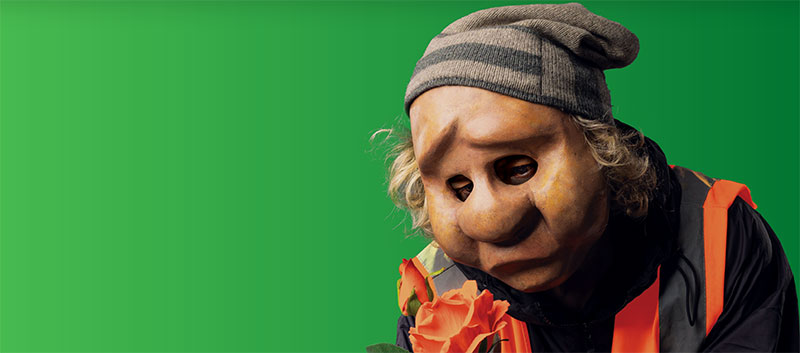Review: Effy
Reviewed by Lox Dixon.
Presented as a part of the TAHI Festival, 2022.
Effy is a piece of physical theatre performed by a masked actor, and featuring no verbal communication.
The show takes place in what ostensibly looks like a public park. A rubbish bin sits on one side of the stage, an old wooden bench seat with ornate metal detailing on the sides sits on the other. The titular character takes the stage dressed in high vis and armed with a large wooden broom. They proceed to carry out manual labour tasks that read as an attempt to clean up the park area.
From the get-go the nature of the relationship between Effy and the park is unclear. At first the situation reads like they are starting their work day, entering from offstage as if they’ve come from somewhere else, cleaning up the park area and then sitting down on the bench to eat their lunch. Later in the show, Effy curls up to sleep on the bench, and I start to wonder whether they live here, or spend their days here voluntarily cleaning rather than as an employment arrangement.
There are two things that are abundantly clear as the performance unfolds: Effy struggles to do a range of everyday things that most people would not struggle with, and Effy is lonely but desperate to connect. The first plays out as evident as Effy attempts to eat lunch and has a comical struggle with both the gladwrap on their sandwich, and a pair of rubber gloves.
The second is clear from the get-go, every action Effy takes is followed up with a look out to the audience. The expression on the mask, which reads from neutral to slightly pained through the different lighting sequences and changes in physicality from the actor (Bridget Sanders), comes across as seeking our approval, or at the very least looking to connect with us.
The narrative structure is often hard to interpret given the non-verbal nature of the piece, but the things I can say for sure are that this show features an epic recurring struggle between Effy and a duck, explores Effy’s need to express themself creatively, and shows us that Effy is a person desperate to make connections with other living things.
This show invites us to think about what human connection looks like, offers a compelling look into neurodivergence, and leaves us both feeling a bit sorry for Effy who seems to long for a friend, and feeling a bit sorry for ourselves as we reminisce on moments where we have tried our best to connect as our most authentic selves, and been rejected or held back because of societal norms.
The level of narrative able to be told, and the emotional resonance of the show (including a healthy dose of laugh out loud humour throughout), are no easy achievement for a show relying for the most part on the physical performance of the actor on stage, and on the light and sound cues being expertly timed. Everyone involved in this show should be proud, and if the above sounds like a show you would enjoy, I highly recommend seeing it.

